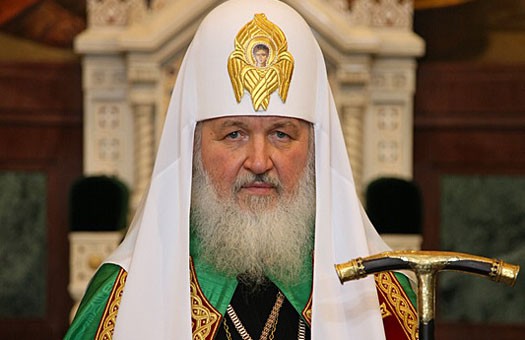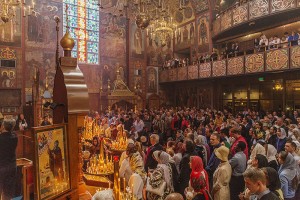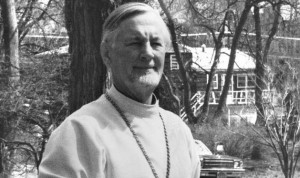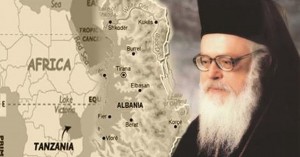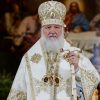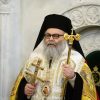I would like to heartily welcome all of you who have assembled here today at the opening ceremony of the fifth Diocesan Missionaries Gathering at this hall. Mission as witnessing to Christ the Savior is one of the prime goals of the Church. It is the fulfillment of the Lord’s words: “Go ye therefore, and teach all nations, baptizing them in the name of the Father, and of the Son, and of the Holy Ghost: Teaching them to observe all things whatsoever I have commanded you” (Matthew 28, 19-20). This great command is directly connected with the main aim of the Church’s existence: the connection of people with God. The unity with the Creator is impossible without gaining the faith, but as the Holy Apostle Paul said: “How then shall they call on Him in Whom they have not believed? and how shall they believe in Him of Whom they have not heard? and how shall they hear without a preacher?” (Roman 10:14).
Therefore, any church activity should be connected with witnessing to Christ the Crucified and the Resurrected. The active church construction, when new dioceses appear, is especially relevant to the modern times.
Any newly formed diocese is not merely one more territorial-administrative unit, but also a new field for mission, which requires the high level of responsibility of church workers for the organization of missionary work.
Inter-regional conferences between chairmen of diocesan missionary departments took place in preparation for the current missionary gathering. The conferences focused on a large number of issues, including one concerning the organization of missionary work in the newly formed dioceses. Significantly, the participants shared the same opinion on the fact that missionary work should have a systematic and regular approach. However, I would like to note that sometimes such ideas are proposed in documents, but in practice nothing is done.
For this purpose, it is crucial to create a certain missionary map of each diocese, which would include not merely information on the quantity and the density of population, but also reports on the activities of dissenting and pseudo-Orthodox communities, and also various sects. Moreover, this map should specify the priorities of each diocese over their activities, for example at educational, medical, social, or penal institutions.
This map should become a guide to our missionary work and one of the key information sources, in particular, for the highest church authority.
Missionary activities among residents of outlying towns of Siberia, the Far East, and the Far North are quite topical. It is a traditional approach to mission, which was already formed in the pre-revolutionary period, and it is the priority of our Church. But if in the nineteenth century the missionary efforts focused mainly on representatives of the indigenous peoples, then today it is just as crucial to work with people who – belonging to the Orthodox tradition ethnically and culturally – are happened to be cut off from not merely well-being of civilization, but also communication with Orthodox spiritual centers – churches and monasteries – due to various practical reasons. The presence of priests at the places where people work in harsh conditions, such as oil-derricks or gas fields, is as important as the presence of chaplains in the armed forces.
The most effective form of missionary work has been missionary camps in these regions for the past several years. Remarkably, the number of missionary camps has increased almost twice since the fourth All-Church Orthodox Missionary Gathering in 2010. However, its number is yet quite low.
A missionary camp should become the beginning of a fully functioning church community, which would unite people and give them an opportunity to feel human and Christian solidarity, especially under very difficult conditions of life. There is an excellent example of the “Spasski” missionary camp in the village of Tiksi in the Yakutia Diocese situated by the Laptev Sea in the Arctic desert. It was constructed under harshest conditions, including climatic, social, and economic situations. It was decided to close the long-range aviation base situated in the village in the middle of 2013. Hundreds of military men together with their family members left the village. As a result, the heating system was turned off, kindergartens closed, and air communication with the so-called “large earth” broke down. Having been united by Hegumen Agafangel (Belykh), the worker of the Synodal Missionary Department, the people who stayed built the missionary camp with support of benefactors. As if a reply to their faith, the army command decided to restore the village.
People started to return to Tiksi. In October, 2014 the St. Nicholas-St. Seraphim Church, which is situated on the premises of the “Spasski” missionary camp, was consecrated by Metropolitan Ioan of Belgorod and Stary Oskol, Chairman of the Synodal Missionary Department, and Bishop Roman of Yakutia and Lensk. This is, of course, a great event in the field of our missionary work in the Northern Russia.
Unfortunately, the temporary presence of clergymen pursuing missionary goals at some outlying districts cannot be a remedy to the problems of the lack of clerics at the local parishes. The aim of a missionary is to direct people’s hearts and minds toward God, baptize them, and to teach the basics of the Gospel truth. However, spiritual life of new converts does not end there, but only begins. The newly baptized person requires constant pastoral care, nonstop care for his or her souls, and, of course, regular participation in the Liturgy and Holy Communion.
Therefore the creation of a constantly functioning church, or at least a prayer room, is especially topical. More importantly, it is relevant to have a full-time priest who would take care of the flock given to him by God.
Mission connected with native and small peoples often encounters another significant issue concerning the correlation of national culture and the Christian faith, which the new believers find in the form of Russian Orthodoxy. Does it mean that a person, who is a member of one of the ethnic groups of Siberia or the Far East, is supposed to abandon his or her native cultural traditions after being converted?
In this case, it should not mean Russification, in other words, the abandonment of the local culture, but the addition of Christian ideas to this culture. Therefore I am certain that mission should be connected with the work on the preservation of national cultures and their restoration. That is how our greatest missionaries worked in the nineteenth and the beginning of the twentieth centuries. They made translations of liturgical and Biblical texts which, in particular, contributed to the formation of national script and literature.
In addition to traditional forms of mission, it is essential to use modern methods and to consider the social context of an epoch. Information and communication technologies have advanced dramatically. A true information revolution has occurred in the world, to say the least. As a particular result, educational and apologetics activities of Orthodox Christians accelerated in the mass media, the Internet, and especially, in the social network.
However, working in all information fields mentioned above, a Christian is called by God to realize the serious responsibility for the contents and also the style of his or her statements, even if they are in polemic context. We should not provide an opportunity for censure for those who are looking for such opportunities.
The task of a missionary does not consist of winning in a dispute, but of drawing people’s attention by his or her personal example, words, and love, because frequently the victory in a dispute means losing any opportunity to accept Christ for the defeated opponent. Consequently, I encourage you to participate in any disputes carefully. Truth is not born of arguments, it is born of a serious discussion which is aimed at solving a certain problem.
Anti-sect and anti-dissent activities are closely related to apologetics. This work should remain one of the essential aims of missionary service, together with the protection of traditional Christian values and the way of life in the face of primarily aggressive secularism.
However, missionaries, including those who work at parishes, should have an adequate level of knowledge and education so that their words would sound convincing and authoritative.
Today the “Russian Orthodox Church Missionary Work Concept” has been implemented successfully, which was approved by the Holy Synod in 2007. Under this project, an educational standard has been developed and various documents regulating the training of missionaries have been adopted. There is a critical issue on the agenda, which is the organization of missionary training at seminaries and other educational institutions of our Church. The way this task is implemented will show the attitude of diocesan hierarchs and chairmen of theological institutions towards mission.
I am asking Vladyka Varsonofy to watch the statistics showing what is going on in the missionary work in every diocese, including the number of missionaries who have finished training, how many parishes have missionaries, and how diocesan and deanery missionaries work. Looking at these figures, we will be able to consider the attitude of a hierarch toward mission in deeds, not in words. Today the missionary topic is vital for the Church.
Another criterion is the organization of missionary work at parishes, including the assignment of paid specialists in mission and catechism to parishes. Despite the announced decisions of the Hierarchal Council and the Holy Synod, this work is done slower than I would wish it to be done. Therefore standing at this missionary gathering, I once again address the Very Reverend Vladykas and Fathers: we should accelerate significantly both the training of mission and catechism specialists, and also their assignment to parishes, which are situated first of all in towns where this service is in special demand. I am already not speaking about adequate workers in diocesan departments and deaneries. Undoubtedly, the positions should be filled at the places where they have not been obtained yet.
It is likewise essential to note that missionary work should not end with primarily the work of a specialist in a diocese, deanery or a parish. Every church presented by its rector, clerics, parish workers and churchgoing parishioners is called to become a participant in the mission of witnessing to Christ before neighbors and those who live far away, and in involving them in the church life of a congregation. All members of a parish, moreover, its workers, conduct a common deed, the deed of God. This deed should be conducted with eagerness for the Lord’s glory to fulfill the words of the Savior: “ye shall be witnesses unto Me both in Jerusalem <…> and unto the uttermost part of the earth” (Acts 1:8).
The goal of this witnessing is not merely the perception of the faith, but the life itself in accordance with this faith. The life that is an excellent example of witnessing to Christ, Who said: “Let your light so shine before men, that they may see your good works, and glorify your Father which is in heaven” (Matthew 5:16).
I wish all of the participants of this gathering, all missionaries, diocesan hierarchs, rectors, and rural deans fruitful work in church mission.












